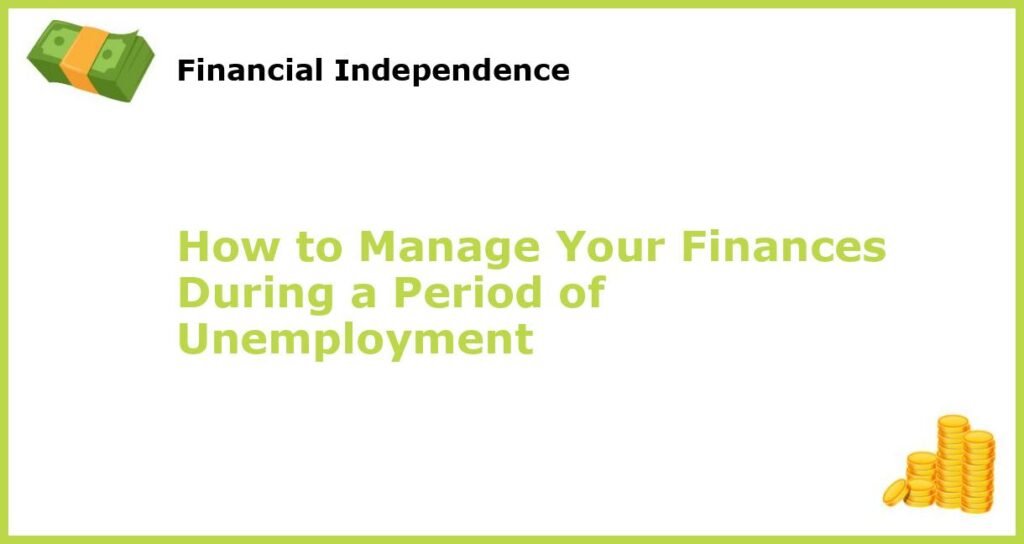So you’ve found yourself in a bit of a bind and you’re unemployed. Don’t worry; you’re not alone. Thousands of people lose their jobs every year due to a multitude of reasons. Regardless of why you lost your job, the important thing is that you have a plan to manage your finances until you find new employment.
1. Take Stock of Your Finances

The first step in managing your finances during a period of unemployment is to take a critical look at your finances. You will need to identify all your financial sources of income, including any government financial help program you may qualify for, severance pay, and unemployment benefits. Additionally, you will need to make a list of all your essential expenses, like rent/mortgage, utilities bills, groceries, and other bills.
Once you have identified your finances, you can make a plan to manage your money. This could mean looking for better deals on certain expenses and renegotiating your monthly bills.
2. Cut Back on Expenses

Managing your finances during unemployment can be challenging, but cutting back on expenses can help you stretch your finances. It may not be desirable or easy, but it is an excellent way to stay afloat during this challenging period. Consider canceling any subscriptions or memberships that you aren’t using regularly. Shop around for better deals on things like car insurance or cell phone plans. Every penny counts when you’re unemployed, so try to be as frugal as possible.
For instance, consider ditching cable and investing in a streaming service that is affordable. You may also want to consider buying generic products instead of expensive brands. Furthermore, minimize the number of time you eat out, and instead, cook your meals or opt for meal prep, as it saves both time and money.
3. Talk to Your Creditors

If you are foreseeing difficulty paying your bills, consider contacting your creditors. They may be able to work with you to come up with a reasonable payment plan that’s within your current budget. This could mean reducing your monthly payments or waiving late fees. Whatever the case, keeping them in the loop is important.
In light of the recent happenings, most creditors understand the uncertainty surrounding employment during this pandemic, and communication is critical. Keep your creditors updated on your financial situation, and they will offer helpful advice and recommendations.
4. Look for Ways to Earn Extra Income

If your finances are not stretching as far, you may need to look for ways to supplement your income. Consider taking on a part-time job while you search for full-time employment or turning a hobby into a side hustle.
Additionally, you can find freelancing opportunities online, such as writing, graphic design, or social media management. Naturally, this will require some time management, but the extra income should help you make it through these challenging times.
5. Prioritize Your Bills

If you’re struggling to make ends meet, you have to make tough decisions when it comes to bills. Prioritize your bills based on importance, paying essential bills first. Rent, utilities, and other critical expenses should be your top priority. Other bills like credit cards and loans can be dealt with by contacting the respective organizations and asking for extended payment periods.
6. Create a Budget

A budget is vital in times like these. It helps you plan how to use the available finances in the most effective way possible. Your budget should include plans for your income and expenses. When creating your budget, make sure to prioritize your essential bills first and allocate money for groceries and other expenses. You should stick to your budget as much as possible, but feel free to make adjustments as required.
There are many free online tools, like Mint, to help you with your budgeting. Utilize the available resources to ensure that you don’t fall further into debt.
7. Keep Your Credit Score in Mind

Your credit score can be a determining factor when looking for a new job, getting a loan or purchasing a home. Consequently, it is essential to keep your credit score in mind. Pay your bills on time, keep your credit utilization minimal, and avoid new credit applications unless necessary. Your credit score will be important when you start looking for new employment, so don’t neglect it.
8. Take Advantage of Government Programs

The government offers financial programs to people who are out of employment in need of assistance. These financial loans offer a safety net to help you make ends meet while job hunting. Enroll for unemployment benefits, food assistance, or any other relevant programs that can help your cause.
9. Seek Professional Advice

If you find managing your finances challenging, it is recommended to seek professional advice. Credit counselors can help develop a plan to manage your finances and avoid falling into further debt. Financial advisors can provide advice on how to invest any funds you might have and also help you to plan for the future.
10. Stay Positive and Keep Moving Forward
Finally, it’s essential to maintain a positive outlook on life during these challenging times. It can be stressful waiting for job interviews or results from applications, but remember you are not alone, and everything will be okay. Continuously work at managing your finances as best you can and stay open to new opportunities. With hard work and persistence, you can overcome this challenge and come out stronger on the other side.







